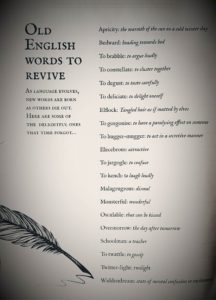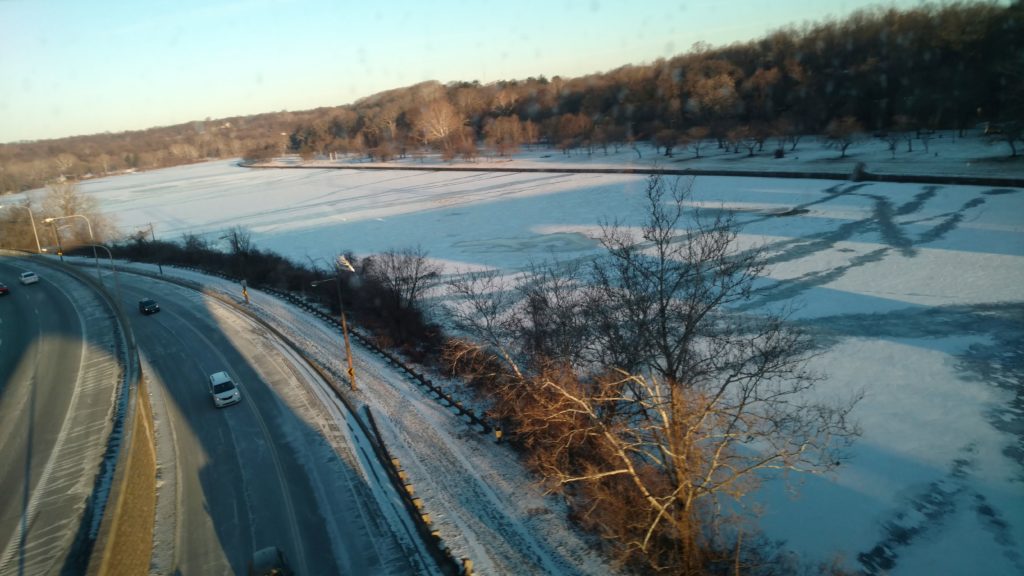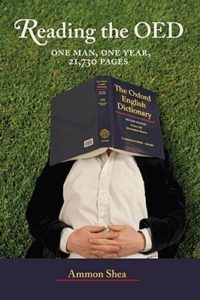 A couple of months ago, a friend posted a list** of “Old English Words to Revive,” and I was charmed to see that the first word on the list was “apricity”.
A couple of months ago, a friend posted a list** of “Old English Words to Revive,” and I was charmed to see that the first word on the list was “apricity”.
I first came across the word apricity nearly ten years ago, in a book by dictionary collector Ammon Shea called Reading the OED: One Man, One Year, 21,730 Pages. Shea sat down every day for a year (okay, he changed position occasionally) and read the Oxford English Dictionary cover to cover (even the 451 pages of self-explanatory “un-” words), narrating as he went, with different chapters focusing on dictionaries, or libraries, or blinding headaches… At the end of each letter’s chapter he presented a list of words he found particularly noteworthy, and I began a practice of learning at least one from each chapter. Due partly to the primacy effect and partly to the fact that it instantly became and remained my favorite, my word from the first chapter is the one I have remembered longest. Here’s what he has to say about it:
Apricity (n.): the warmth of the sun in winter.
“A strange and lovely word. The OED does not give any citation for its use except for Henry Cockeram’s 1623 English Dictionarie. Not to be confused with apricate (to bask in the sun), although both come from the Latin apricus, meaning exposed to the sun.”
I have been most pleased to have this word at my disposal of late, since I’ve found that no matter how cold it has gotten in the past few months, and especially in the past few weeks, nor how well bundled up I am (which has been pretty well, in fact, for which I’m extremely grateful), there is something remarkable about stepping into the sunlight and feeling just the tiniest respite. And so I’ve been remarking upon it.

A view from the train last week.
There are some other interesting and illuminating references to the word “apricity” scattered about the Internet. Here’s one from young adult author Julie Glover (in a post from 2014 that starts off with a link to a BuzzFeed list of similarly obsolete words, illustrated entirely with owls):
“Apricity. Here’s a word you’ll especially appreciate this time of year. Apricity is the warmth of the sun on a cold day. Have you enjoyed a moment of apricity lately? The word hails from the Latin apricus, which means exposed to the sun. It’s the same stem from which we (eventually) got the word apricot. The word is first referenced in a dictionary from the 1620s, but it no longer makes the cut in current dictionaries.
Which is a shame, because I could really use a word for that sense of sunny warmth as soon as I walk out from the coffee shop I’m currently in and emerge into the frigid (well, frigid for Texas) weather. I plan to revel in the apricity anyway.”
Yum, apricot.*** And here’s another, from Merriam-Webster’s Words at Play feature:
About the Word
This word provides us with evidence that even if you come up with a really great word, and tell all of your friends that they should start using it, there is a very small chance that it will catch on. Apricity appears to have entered our language in 1623, when Henry Cockeram recorded (or possibly invented) it for his dictionary The English Dictionary; or, An Interpreter of Hard English Words. Despite the fact that it is a delightful word for a delightful thing it never quite caught on, and will not be found in any modern dictionary aside of the Oxford English Dictionary.
Example
“These humicubrations, the nocturnal irorations, and the dankishness of the atmosphere, generated by a want of apricity, were extremely febrifacient.” Lorenzo Altisonant (aka Samuel Klinefelter Hoshour), Letters to Squire Pedant, 1856****
Shea says, at one point in his book, referring to certain words that have gone out of favor:
“Even though I do not feel a need to remember these words, I do feel a need to know that someone has remembered them. It is comforting to me to know that they have not been wholly cast aside, and are still available to anyone who cares to visit the OED, whether it is some poet trying to find the right word to make verse properly obscure or a head-scratching child trying to make sense of some obscure poet she’s been assigned to read in school. The fact that the OED cares so much about words that almost everyone else happily ignores is one of its finest traits.”
So here’s one I feel the need to remember, and clearly, despite Merriam-Webster’s caution, it also wants to make a comeback. Let’s see whether we can bring this one to an higher level of consciousness and give it (at least) the moment in the sun that it truly deserves.
—–
* More alliterative than predictive, I think. Especially since my original idea for this post was back in November. The fall had been so unseasonably warm, and the transitions back and forth so abrupt, that even the chilly days near Thanksgiving seemed extra cold. Had no idea then that we’d soon be facing a nationwide cold snap quite like this one!
** Hat tip to Kathryn Perko.
Image apparently from Breathe Magazine via FB page of Watkins Books, an esoteric bookshop in London.
With a caveat that I’m posting it here because it’s pretty. “Old English” should be taken with a grain of salt,***** and I’m actually not on board with reviving all of these words.****** “Schoolman”? Not only is it fairly transparent (that is, someone could make it up independently), but also we’ve all been working rather hard to have *fewer* professional names that specify sex/gender. It does have an evocative feel to it, but I think it should stay happily archaic.
***My first taste of a fresh apricot, after many years of eating dried ones as childhood snacks, echoed my response to eating a real fig for the first time: “Oh! It’s…it’s like a Fig Newton, only more so!”
****Indeed.
*****Or possibly less salt; it has been pointed out to me (thanks, Dan D.) that the list creators may have been trying to say “Old [English words]” rather than “[Old English] words”. Which I suppose I can see…
******There are some I like a lot, though, and could imagine using: “As it happens, the alternative to bedward braiding is to awaken in the morning with total elflock.”
